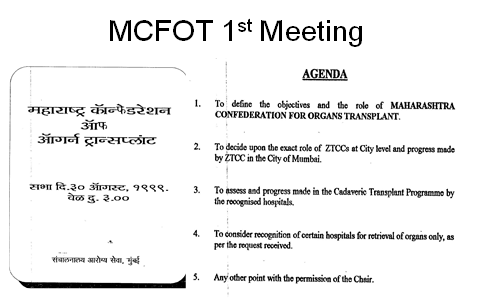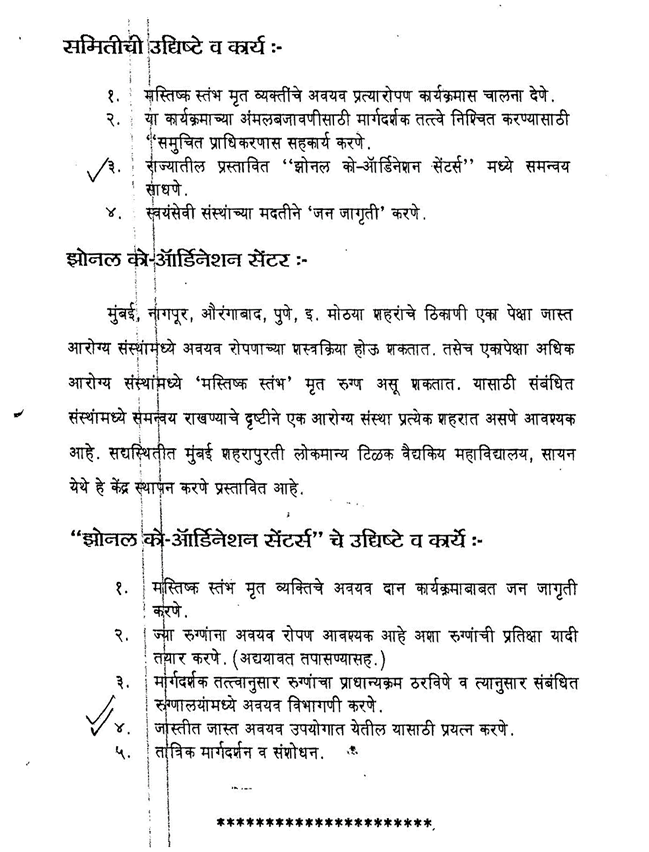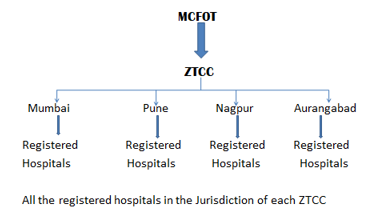OUR HISTORY - ZTCC, MUMBAI
Home/Our History

Our History
MCFOT (Maharashtra Confederation for Organ Transplantation) & ZTCC (Zonal Transplant Co-ordination Centre)
Human Organ Transplantation Act was passed in 1994 in India and it was adopted by Maharashtra in 1995.
TOHA-1994 was enforced in Maharashtra in Feb.1995.
- DHS designated as -State Appropriate Authority
- DMER designated as -State Authorization committee
- Maharashtra Govt. recognized institutions for transplantation and brain death committees.
- Maharashtra Govt. issued State Guidelines to implement the Deceased Donor Transplant .
The Appropriate authority gave registrations to the hospitals for retrieval and transplants of the organs.
On 24th May 1995 Directorate of Health Services held the meeting of the experts (Late Dr. V N Acharya, Dr A Kriplani, Dr G B Daver and Dr S K Mathur) to discuss about implementation of deceased donor programme in Maharashtra.
On the recommendation of expert Panel;
On 9th July’ 1999, Maharashtra Government issued Government Resolution (GR) for the implementation deceased donor transplant programme in state of Maharashtra.
This GR of 1999 also notified the formation of the, “Maharashtra Confederation for Organ Transplant” (MCFOT) as state level body and Zonal Transplantation coordination Centres (ZTCC) at zonal/city level.
MCFOT was formed with the aims to promote deceased donor transplant programme in the state, to cooperate with the Appropriate Authority for implementation of deceased donor programme and to coordinate with the city level coordinating agencies,[ ZTCCs] and to create awareness about organ donation.(Annexure 3)
The 1st meeting of MCFOT was held on 31st August 1999 under chairmanship of Mr T. C. Benjamin Secretary Medical Education and Drug Department with following agenda: :

Aims & Objectives of MCFOT & ZTCC

The Zonal Transplant Coordination Centres were proposed at four cities, Mumbai, Pune , Nagpur and Aurangabad. Presently all the four ZTCCs are functioning efficiently

Functions of ZTCC, Mumbai
- To maintain the common waiting list of needy recipients for each organ at the city level.
- To distribute the organ to the most suitable recipient as per the priority criteria given in the state guidelines.
- Co-ordinate all activities for procurement of organs
- Organize awareness program for professionals as well as public to promote Deceased transplants.
Mumbai ZonalTranspalnt Coordination Center, was the first ZTCC which was created by MCFOT in its meeting held on 31st March’ 2000 and started functioning in the same year under the chairmanship of Mr, Julio Reberio IPS(Retd.) and Dr Vatsala Trivedi HOD Urology LTM Medical college and Hospital was nominated as Secretary. First meeting was held on 18th Dec.2000 under the chairmanship of Mr. Julio Reberio, 13 registered hospitals participated. Mrs Sujata Ashthekar became the first Hon. Transplant Coordinator with ZTCC Mumbai. In Year 2001, Memorandum of Association and Rules Regulations were framed and registered with Charity Commissioner. The Constitution of ZTCC Mumbai was subsequently amended in Year 2005 and 2013.
Zonal Transplant coordination Centre Mumbai, is not-for-profit, government formed coordinating agency for Deceased organ Distribution under the Society Act and registered with charity commissioner’s office
Other ZTCCs followed similar memorandum, rules and regulations.
Composition of ZTCC, Mumbai
Members- All the registered Transplant Hospitals in Mumbai suburbs and Thane city are the members of the ZTCC, Mumbai. (it is made mandatory for them by the State.) It also has the membership of NGOS who are promoting organ donation and deceased Donor Transplant.
A.Executive Council:-It consists of following members.
- President [elected]
- Two Vice President [elected]
- Gen. Secretary [elected]
- Joint Secretary [elected]
- Treasurer
Chairpersons of expert subcommittees are also the members of executive council.
Meeting of executive council is held once a month.
B.Governing Council
It consists of following members.
- CEOs/Deans/Commandants of all recognized member hospitals.
- Representative from NGOs.
- Chairpersons of all expert committees
- Representative of State Appropriate Authority
- Invitee members.
Meeting of Governing Council is held every three months.
C.General Body:-
All members of various committees are the members of General Body.
The meeting of the general body is held once a year.
ZTCC formed expert committees for providing technical guidance. Expert’s members [one physician and one surgeon] of these committees are from all recognized institution and form subcommittee for each organ e.g.
- Kidney and pancreas
- Liver
- Heart
- Bone marrow
- Cornea
- Skin and tissue bank
- Social workers/Transplant Coordinators committee
- Any other organ
The meeting of the expert committee is called by a chairperson as and when required.
Miscellaneous Subcommittee formed by the nomination.
- Internal audit committee
- Ethics committee
The chairman and the Secretary are elected by individual committees.
The term of each committee is for three years.
The members have right to get re-nominated for totally 2 terms only.
ZTCC is an organization on par with international standards with following main aims.
- To promote deceased donor [cadaver] transplant.
- Optimal use of all cadaveric available organs.
- To reach out to every needy waiting recipient with fair distribution of organs as per government guidelines.
Transplant Registry
The ZTCC, Mumbai maintains the computerized waiting list blood group wise for each organ like kidney, liver, heart and lung as per the priority criteria given in the Maharashtra State guidelines. All the registered transplant hospitals send the information of the patients required cadaver organ in the prescribed form for listing. For kidney, each patient is given priority score as per the guidelines. Criterias for the score are like age of the patient, period on dialysis, waiting period with ZTCC, earlier graft failure, fistula failure etc. For liver, priority is mainly as per the blood group and date of registration if there is no patient in super urgent category. The patient’s name is registered through hospital and the patients cannot get registered directly to the ZTCC. When the organ is available the organ is offered to the patient only in the hospital from where it is registered with the ZTCC.
As on January 2018, there are 35 hospitals registered with ZTCC, Mumbai. There are approximately 3400 patients waiting for kidney, 280 for liver and 35 for heart and 5 patients for lungs.
Organ Distribution
When there is a brain death in the registered hospital in Mumbai and nearby suburb, the ZTCC,Mumbai is informed. The first kidney goes to the donor hospital patient having highest priority score in that blood group. The second kidney is offered to the patients on city waiting list as per the priority score. The liver is first offered to the patient listed in the super urgent category [this listing is done after the expert committee approval], if there is no super urgent category patient then the liver is offered to the donor hospital. If there is no patient from the same blood group on the hospital list then the liver is offered to the city waiting list.
The ZTCC Co-ordinators contact hospital co-ordinators who inform the patients about the availability of the organ. The distribution report and reason for refusal are written and filed in the ZTCC office
If there is no recipient in the city for any organ then the organ is further offered to other ZTTCs in the stateand then to Reional or National level through ROTTO-SOTTO.[Regional and State Organ and Tissue Transplant Organisation]
Awareness and promotional Activities-
The ZTCC, Mumbai has been promoting organ donation by conducting various awareness activities.
- Pamphlet and Donor Card distribution – Donor card pamphlet has mobile nos. which are contactable day and night.
- Putting up stall at community meetings. Ganesh Mandals, NavratriUtsav , Colleges, corporate etc.
- Awareness talks- ZTCC representatives go to various places to give talks or power point presentation on organ donation. Like,
- various Social groupse, Rotary club, Lions club, Mahila Mandals, Ganesh Mandals
- Community gathering
- Corporate offices
- Religious places like temples, churches, Gurudwara
- Participate in Rallies, Marathon to promote organ doantion
- Co-ordinate for role plays, street plays on organ donation with the help of college students, office workers.
- Newspaper reports, magazines- The ZTCC members have written articles in magazines to promote organ Donation
- Donor family Felicitation is organised every year to appreciate and felicitate the family members of the brain dead donors for their noble contribution.
Training programmes
We conduct CMES in the hospitals and for NTORCS to sensitize the professionals. Conduct training programme for MSWs/ para-professionals.